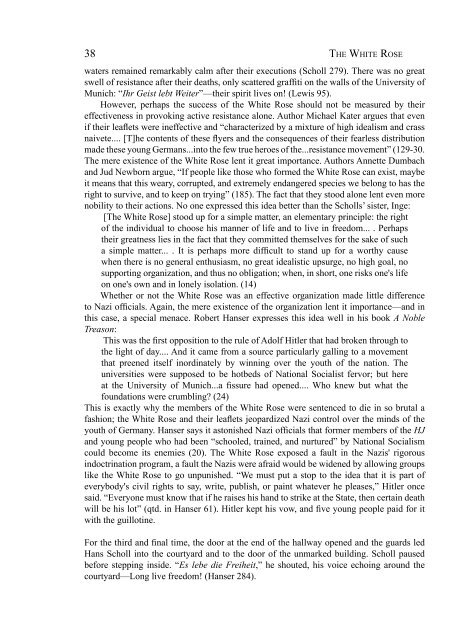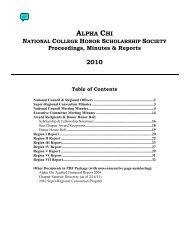Vol. 52, No. 1, 2009 - Alpha Chi
Vol. 52, No. 1, 2009 - Alpha Chi
Vol. 52, No. 1, 2009 - Alpha Chi
Create successful ePaper yourself
Turn your PDF publications into a flip-book with our unique Google optimized e-Paper software.
38<br />
Th e Wh i t e Ro s e<br />
waters remained remarkably calm after their executions (Scholl 279). There was no great<br />
swell of resistance after their deaths, only scattered graffiti on the walls of the University of<br />
Munich: “Ihr Geist lebt Weiter”—their spirit lives on! (Lewis 95).<br />
However, perhaps the success of the White Rose should not be measured by their<br />
effectiveness in provoking active resistance alone. Author Michael Kater argues that even<br />
if their leaflets were ineffective and “characterized by a mixture of high idealism and crass<br />
naivete.... [T]he contents of these flyers and the consequences of their fearless distribution<br />
made these young Germans...into the few true heroes of the...resistance movement” (129-30.<br />
The mere existence of the White Rose lent it great importance. Authors Annette Dumbach<br />
and Jud Newborn argue, “If people like those who formed the White Rose can exist, maybe<br />
it means that this weary, corrupted, and extremely endangered species we belong to has the<br />
right to survive, and to keep on trying” (185). The fact that they stood alone lent even more<br />
nobility to their actions. <strong>No</strong> one expressed this idea better than the Scholls’ sister, Inge:<br />
[The White Rose] stood up for a simple matter, an elementary principle: the right<br />
of the individual to choose his manner of life and to live in freedom... . Perhaps<br />
their greatness lies in the fact that they committed themselves for the sake of such<br />
a simple matter... . It is perhaps more difficult to stand up for a worthy cause<br />
when there is no general enthusiasm, no great idealistic upsurge, no high goal, no<br />
supporting organization, and thus no obligation; when, in short, one risks one's life<br />
on one's own and in lonely isolation. (14)<br />
Whether or not the White Rose was an effective organization made little difference<br />
to Nazi officials. Again, the mere existence of the organization lent it importance—and in<br />
this case, a special menace. Robert Hanser expresses this idea well in his book A <strong>No</strong>ble<br />
Treason:<br />
This was the first opposition to the rule of Adolf Hitler that had broken through to<br />
the light of day.... And it came from a source particularly galling to a movement<br />
that preened itself inordinately by winning over the youth of the nation. The<br />
universities were supposed to be hotbeds of National Socialist fervor; but here<br />
at the University of Munich...a fissure had opened.... Who knew but what the<br />
foundations were crumbling? (24)<br />
This is exactly why the members of the White Rose were sentenced to die in so brutal a<br />
fashion; the White Rose and their leaflets jeopardized Nazi control over the minds of the<br />
youth of Germany. Hanser says it astonished Nazi officials that former members of the HJ<br />
and young people who had been “schooled, trained, and nurtured” by National Socialism<br />
could become its enemies (20). The White Rose exposed a fault in the Nazis' rigorous<br />
indoctrination program, a fault the Nazis were afraid would be widened by allowing groups<br />
like the White Rose to go unpunished. “We must put a stop to the idea that it is part of<br />
everybody's civil rights to say, write, publish, or paint whatever he pleases,” Hitler once<br />
said. “Everyone must know that if he raises his hand to strike at the State, then certain death<br />
will be his lot” (qtd. in Hanser 61). Hitler kept his vow, and five young people paid for it<br />
with the guillotine.<br />
For the third and final time, the door at the end of the hallway opened and the guards led<br />
Hans Scholl into the courtyard and to the door of the unmarked building. Scholl paused<br />
before stepping inside. “Es lebe die Freiheit,” he shouted, his voice echoing around the<br />
courtyard—Long live freedom! (Hanser 284).









